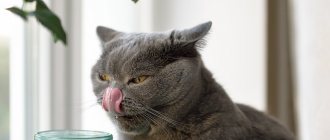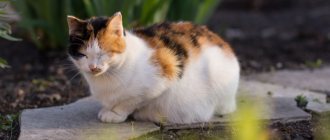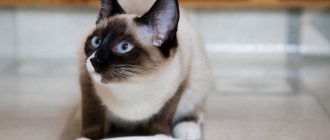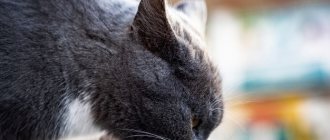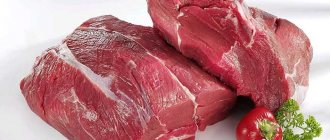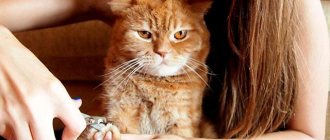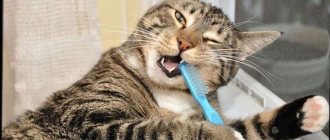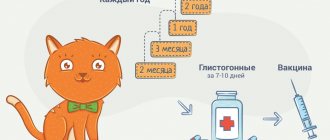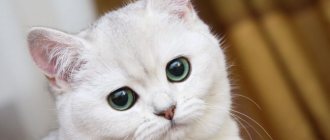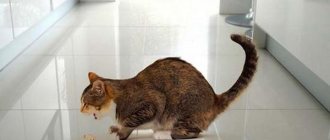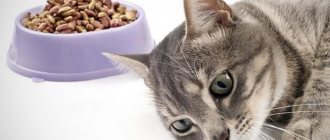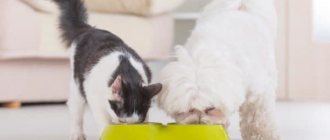When a cat is waiting for a replenishment, you need to try to do everything to make it more comfortable and calm for her to endure her position. Properly balanced food plays an important role for the full intrauterine development of future offspring. That is why a caring owner should know what to feed a pregnant cat, what can be given to her, and what is strictly prohibited. We will devote this article to this issue.
Principles of feeding a pregnant pet
When compiling a diet for an expectant mother, it is necessary to follow the rule: food must be balanced and varied. Creating the same menu for the entire period of an animal’s interesting situation is not the best idea, because each period requires a review of the quantity and variety of food offered . But for the entire gestation period, food for pregnant cats must be of excellent quality, it must contain:
- Vitamins;
- Proteins;
- Minerals;
- Microelements.
Most often, from the first days of its placement, the animal’s appetite increases, and there is a need to have a snack between main meals. Take your time to increase the amount of food offered. It is better to do this gradually, avoiding overfeeding.
© shutterstock
The importance of proper nutrition
Love and care are important for a pregnant cat, but more prosaic signs of attention from the owner come first.
The birth of life is accompanied by an increase in the expectant mother’s body’s need for energy. It can only be replenished by a balanced diet for a pregnant cat. Namely: proteins, carbohydrates, vitamins, fiber, minerals, amino acids - otherwise the formation of offspring will occur at the expense of the resources of the mother’s body.
Feeding your pregnant cat well will ensure that the kittens are born on time. The risk of giving birth to sick and undeveloped offspring will be reduced. After giving birth, your pet will recover much easier and faster, without the risk of critical exhaustion. In addition to pregnancy, nutrition also provides a reserve of strength to perform further responsibilities. It is important for a nursing cat to produce milk, and not to restore its own strength.
Features of the diet at different stages of gestation
During the first two weeks, it is correct to feed a pregnant cat only 10 percent more than usual. It is important to remember that it is not the amount of feed that is increased, but the frequency of feedings . This will make it possible to reduce the risk of obesity in the animal, which can lead to a difficult birth. Don’t forget that your pet moves much less and sleeps more and more.
By the end of the first trimester, it is recommended that pregnant cats increase their diet by another 50 percent. Considering the individuality of each organism, it is worth listening to the needs of the cat; she herself will tell you how much and when she needs to eat.
Often, at the beginning of the last trimester, cats begin to eat little. This is due to the fact that there is less and less space left in the abdominal cavity for the usual volume of food, because the kittens are actively growing.
A few days before giving birth, caring owners worry that the cat has refused to eat at all. There is no need to worry, this is how her body reacts to the upcoming event.
How many times a day can you feed a pregnant cat?
On average, pregnancy lasts about 63 days. This period is divided into three stages, and the nutrition of a pregnant cat at this time varies significantly:
- 7 – 21 days of pregnancy. At the very beginning of the term, the pet’s appetite increases, but this does not indicate the need for constant feeding of the animal. During this period, she should not eat more than 4 times a day. The total increase in feed weight does not exceed 20%. Particular attention should be paid to the British breed, as it has a tendency to become obese.
- 21 – 49 days of pregnancy. During this period, you can increase either the frequency of feedings or the weight of the portion. At this time, the increase in feed intake can be close to 50%.
- 49 – 63 days of pregnancy. This is the final stage of pregnancy, the animal usually feels somewhat worse, and there is a decrease in appetite. The babies become big and put pressure on the animal’s stomach. During this period, the number of feedings remains at the same level, and the portion weight decreases until the first stage of pregnancy.
What to make the right diet from
The daily menu of a pregnant pet should be made up of various dishes and ingredients:
- Beef;
- Cottage cheese, kefir, curdled milk, yogurt (natural);
- Egg yolk;
- Boiled turkey and chicken meat;
- Carrots, cabbage, zucchini, cauliflower,
- Rice, buckwheat,
- By-products in small quantities.
A cat is unlikely to want to eat healthy vegetables. And here you can use a trick: grind the vegetables along with the meat in a blender. So, she will smell and taste the meat, but she will not be able to separate it from the vegetables.
© shutterstock
It is not recommended to introduce fish into the diet of pregnant cats. It does not matter whether it is raw or boiled.
If before pregnancy the animal ate ready-made food, then switching the cat to natural nutrition is not the best option. But it is better to replace the usual dry food with specialized food for pregnant women , and some owners buy kitten food for the expectant mother, which contains everything necessary for healthy offspring.
Features of metabolic processes
Pregnancy is accompanied by an increase in the animal’s body weight, on average by 10-20%. If at first the weight gain is not great, then by the end of pregnancy the weight increases rapidly. At the same time, not only the embryos are enlarged, but also the process of storing nutrients necessary for the subsequent feeding period of newborn kittens is accelerated. These reserves play an important role in milk production and its nutritional value.
The process of deposition (deposition) of mineral components in the body of the fetus and female begins from the end of the 1st - beginning of the 2nd week of pregnancy. Naturally, the need for energy-rich food increases. Energy is now spent not only on maintaining the life support systems of the mother cat, but also on the formation of constantly growing organisms inside her.
Energy expenditures at the beginning of a cat’s pregnancy increase by 1.2-1.5 times, and from the middle to delivery – by 1.5-2 times, compared to basic expenditures. All organs work under load, especially the heart. After all, he has to pump a blood volume that has increased by 40%. This need increases in the first half by 0.5-1 times, and in the second half of pregnancy by almost 2 times.
At week 3, the cat needs 50% more food than before pregnancy. But overfeeding threatens labor complications and the development of very large kittens.
From the 7th week, the female begins to eat less, since the enlarged uterus puts pressure on the intestines, and it is harmful for the cat to increase the amount of food. A larger volume must be divided into more servings. From the 3rd week of pregnancy, the frequency of feedings should be increased to 3 times, and from the 7th week - to 4-5 times.
Before giving birth, the animal may lose its appetite - this is a sure sign of impending birth. You should not force your cat to eat if it refuses. It is enough to give her water and a decoction of raspberry leaves, 1 tsp each. 2 times a day. Increased nutrition is also necessary during lactation.
Protein requirements
During the gestation period, a cat's body requires a high protein content in its food. They are the building material of fetal cells, the building of the immune system in kittens and its normal functioning in cats.
Proteins bind and neutralize toxic components, which is extremely important for preventing late toxicosis. Some hormones are also of protein origin. These include hormones necessary for the normal course of pregnancy, such as:
- gonadotropin-releasing hormone, which regulates the synthesis of follicle-stimulating and luteinizing hormones. Without them, fertilization and conception are impossible;
- somatotropin – a hormone responsible for the growth of the body and regulating the absorption of calcium by bone tissue;
- placental lactogen and 9 more placental hormones;
- prolactin – increases the number of lobules in the mammary gland and is responsible for the production of colostrum and milk.
Equally important to the body are enzyme proteins that regulate all biochemical processes. Even non-pregnant cats need 3 times more protein than dogs, for example. Their body cannot, like a dog’s, reduce the need for protein if it is insufficiently supplied from food. Enzymes begin to decompose liver tissue - the cat and kittens may die.
To fully cover the animal’s protein needs, the diet should include:
- lean poultry (chicken, turkey), beef. The meat must be boiled and cut into small pieces. Its content in the daily diet should be up to 50%;
- by-products of the first category, chicken or beef - heart, lungs, liver, kidneys. It is better to boil or freeze and then scald with boiling water;
- fish – boiled white sea fish fillet;
- chicken egg yolk - raw or boiled;
- fermented milk products - natural yogurt, low-fat kefir, sour cream, cottage cheese, hard cheese.
Only meat is a source of essential amino acids - cystine, taurine, methionine. Their deficiency threatens miscarriage or death of kittens in the womb.
Carbohydrate metabolism
To provide energy processes in a cat's body, carbohydrates are needed. Starch and sugar are quickly digestible carbohydrates. They are rich in cereals, fruits and some vegetables. But their content in the cat’s menu should be strictly dosed.
In order not to cause obesity, it is recommended to cook porridge in water from buckwheat and rice, and steam Hercules flakes. Cats are not particularly keen on eating grains and vegetables, so they need to be mixed with meat to make the healthy dish attractive.
Lipid metabolism
The energy content of the menu can be increased by adding fat. They are more preferable than carbohydrates, since they do not dissolve in biological fluids and do not enter into chemical reactions with them. They are also necessary for developing kittens:
- fats are part of cell membranes;
- isolate nerve fibers;
- retain fat-soluble vitamins.
During pregnancy, they actively accumulate in the placenta, adrenal glands, mammary glands (preparation for lactation) and fetal tissues. A pregnant cat needs vegetable fats to normalize bowel movements. For constipation, just add 1 tsp to porridge or vegetable puree. vegetable oil, and the problem will be eliminated. Fats in a cat's diet should be 15-20%.
Vitamins and minerals
Macro- and microelements are necessary for the cat and her offspring. The need for minerals during this period increases by 20-30%, and during feeding of kittens - by 2-3 times. The animal's diet should be enriched with:
- phosphorus for the formation of the brain, circulatory system and skeleton of the embryo;
- calcium, used for bone mineralization;
- iron, required to increase the amount of hemoglobin and the synthesis of additional blood volume, the formation and functioning of the placenta, the full development of embryos, the preparation of muscles for labor, and then for lactation.
The body of a mother cat and growing kittens needs cobalt, copper, sodium, potassium, and magnesium. For a normal pregnancy you need vitamins:
- C – its need increases 2-3 times, since it is required for the development of the fertilized egg;
- A – for fetal cell division;
- Groups B. For example, thiamine is necessary for the formation of the fetal central nervous system and the normal course of enzymatic processes;
- D – for the prevention of skeletal abnormalities in kittens;
- E – for the functioning of the placenta. With its deficiency, necrotic processes occur in it, and the fetus dies.
You cannot give vitamins and minerals on your own. They are prescribed by a veterinarian, calculating the dosage taking into account the breed, age of the animal, gestational age and number of embryos.
An overdose is just as dangerous as a lack of substances.
There are ready-made vitamin and mineral supplements for pregnant cats on sale:
- Canvit Nutrimin Cat;
- Canina Cat Mineral Tabs;
- Farmavit Neo;
- Beaphar Irish Cal;
- Canina Petvital Biotin Tabs;
- Nutri-Vet Wild Alaskan salmon oil for cats;
- VitamAll Calcium +;
- Radostin.
These complexes are also necessary for cats during lactation. For the normal course of metabolic processes, avoiding constipation, and removing toxins from the body, animals need water. It should always be freely available and in sufficient quantities. Increased absorption of minerals also requires compliance with the drinking regime. Without it, nutrients and water-soluble vitamins will not be absorbed.
Vitamins and vitamin supplements
If a pregnant animal eats ready-made food, there is no need to take additional vitamins, because they are contained in sufficient quantities in the food. But if the pet is fed natural food, it needs to receive vitamins for pregnant cats and minerals as complementary food.
On the issue of supplementary feeding with useful substances, the best thing to do would be to consult an experienced veterinarian.
He will ask you to tell us what you are currently feeding your pet, examine the state of her body, and only then will he be able to advise whether additional vitamins need to be given or whether this is not necessary.
A deficiency, as well as an excess of vitamins, cannot have a good effect on the condition of the animal. Therefore, it is not recommended to buy vitamins and various nutritional supplements for your animal yourself.
© shutterstock
Folk remedies for the health of the expectant mother and babies
To ensure that the animal has plenty of milk for the babies, in the second trimester, you can add boiled and crushed nettle leaves to the food. And to avoid the threat of premature miscarriage, as well as to facilitate childbirth, a good remedy is to drink raspberry leaves. The decoction is prepared as follows: for 200 ml of water, take 1 spoon of crushed leaves, which are brewed, filtered and cooled. During the entire period of pregnancy, pregnant cats are given a teaspoon before breakfast and dinner.
For constipation, oil-containing canned food, as well as vegetable purees with the addition of beet juice, seasoned with vegetable oil, help relieve the animal’s condition, as well as:
- Young wheat sprouts;
- Oats;
- Barley.
Probably everyone knows that it is better to feed a pregnant cat natural products, devoid of any “chemicals”. You can’t feed your pet unhealthy delicacies from the master’s table: sausages, sausages.
Useful tips
Many breeders who are professional breeders and know a lot about cat pregnancy advise feeding expectant mothers with kitten food. The reason is simple: they contain all the necessary ingredients, they are enriched with calcium and other beneficial substances. At the same time, the daily portion is increased no more than 4 times, so that neither the mother herself nor her offspring become obese.
When feeding natural or mixed feeding, pay attention to the pet’s preferences. If suddenly a cat loves something specific and eats a certain product with pleasure, then it is given as much as it wants. As they say, the body is not a fool and regulates its needs naturally. And in order to fill the gaps in certain components, the animal is given the right to choose, that is, they are offered a little bit of everything.
KotoDigest Thank you for subscribing, check your inbox: you should receive an email asking you to confirm your subscription
Veterinarians who monitor pregnant cats advise owners to include in the diet during the 2nd stage of pregnancy nettle leaves, previously scalded with boiling water and chopped as finely as possible. This remedy will help enhance the animal's lactation.
To prevent your pet from having a miscarriage and to make the birth process as easy as possible, you need to give her a decoction of raspberry leaves. To prepare the decoction, take 1 tablespoon of raspberry leaves per glass of boiling water. If you give your cat a decoction of 1 teaspoon 2 times a day, there is a chance to avoid a miscarriage.
When monitoring the nutrition of a pregnant cat, you need to exclude cheap food, treats and low-quality products from the diet. Not only the health of the future offspring, but also the condition of everyone’s favorite depends on the quality of the substances entering the pet’s body.
Features of postpartum feeding
Childbirth is quite a serious stress for the animal’s body. On the first day after them, the young mother can refuse to eat at all; there is no need to force her. But she must be provided with plenty of drink, and the liquid consumed must be nutritious.
Warm milk or low-fat meat broth made from beef or chicken would be a good option.
While feeding kittens with milk, the mother feels a lack of calcium, which can lead to a deterioration in the quality of the coat and twitching of the hind limbs. Sometimes, in especially severe cases, acute deficiency can lead to the death of the animal. To avoid such situations, it is worth seeing a veterinarian and, if necessary, receiving appropriate injections. Otherwise, a nursing cat has the same food as a pregnant cat.
© shutterstock
“British” food - feed, but don’t overfeed!
Separately, we need to talk about how many times a day to feed a British cat. And not at all because representatives of this breed are real charmers and are simply wildly popular today. These cats have a peculiarity - they are more prone to obesity than others. For the British, 2 feedings a day are enough (and for some, once is enough). Naturally, this frequency is recommended for healthy and adult animals.
When transferred to the “adult” schedule, the cat can actively resist and express protest by persistent meowing. But it is better for the owners of this plush miracle to show restraint, not give in to the cat’s demands and see this matter through to a victorious end. A cat accustomed to a schedule will not look longingly into the eyes of its owner every time she eats something tasty and will not “steal” food from the table (but British women are smart and quick-witted, and always notice where “goodies” are hidden ").
Nutritional features of pregnant purebred cats
The gestation period for Scottish Fold and British pets lasts about 65 days. During this period, the animal must receive everything it needs with food, so the food must be of high quality, high-calorie and nutritious. It is optimal to divide your daily diet into five or six meals . Thus, it will be possible to avoid overfeeding, and thereby ease the difficult moment of childbirth.
A complex of strengthening components, including:
- Calcium;
- Magnesium;
- Iodine;
- Potassium;
- Zinc;
- Sodium;
- Iron;
- Vitamins A, D, C, B, E.
Taurine occupies an important place in the rational nutrition of purebred pets. The substance helps prevent the appearance of defects in babies while still in the womb. Amino acids help strengthen the heart, and are also a good preventative against indigestion.
What is forbidden to give
Regardless of the breed, you need to remember that for the birth of healthy offspring there are a number of drugs that should absolutely not be given during pregnancy. These substances include various medications and anthelmintic drugs. In addition, vaccinations, antibiotics, hormones, and aggressive medications for fleas or other parasites are excluded.
© shutterstock
In case of urgent need to treat for any disease, an experienced veterinarian will prescribe the most gentle treatment possible.
